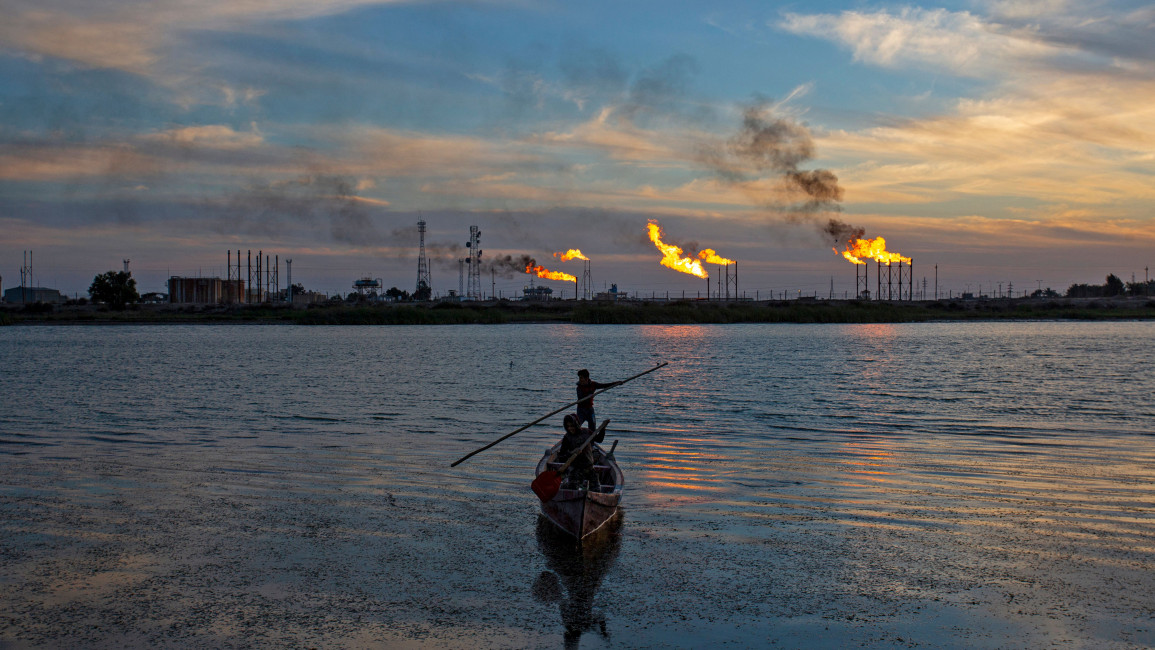Iraq signs contracts with UAE and Chinese companies to invest in gas fields
Iraq's oil ministry on Tuesday signed several contracts with UAE's Crescent Petroleum, China's Geo Jade Petroleum and Hong Kong's United Energy Group (UEG) to develop oil and gas fields in Diyala and Basra provinces, as the country plans to be self-sufficient in gas production within the next three years.
Iraq's PM Mohammed Shiae al-Sudani on Tuesday supervised a ceremony for signing the final contracts for the fifth round of energy licenses with UAE's Crescent Petroleum and China's Geo Jade Petroleum and Hong Kong's United Energy Group (UEG), Iraq's News Agency (INA) reported.
"Reform in the oil sector is the optimal investment of oil wealth, and Iraq's entry into the global gas market is a decision we have planned and will be implemented," the prime minister reportedly said.
"It is unacceptable to continue the mismanagement of burning gas, which wastes wealth and affects the environment. One of the main reasons for the electricity problem is the lack of fuel," Sudani was quoted by INA.
"We import gas at the cost of up to 10 trillion dinars annually; Iraq imports oil derivatives, although it is a producer and exporter of oil. We will reach self-sufficiency in gas within three years to cover all our market demands," he added.
Sudani vowed to provide all resources for the winning companies, mainly in security, legal and administrational areas.
Crescent Petroleum on Tuesday said in a statement that it plans to initially produce 250 million standard cubic feet per day of natural gas from Gilabat-Qumar, and Khashim Ahmer-Injana oil and gas blocks in Diyala province, north of the country. The company said that gas from the Diyala fields is expected to start supplying nearby power plants within the next 18 months.
The company will also develop and explore the Khudher Al-Mai block, located in Iraq's main oil-producing hub Basra.
"Our new planned investments and operations will create thousands of new jobs and support the local and national economy," said Abdulla Al-Qadi, executive director of exploration and production at Crescent Petroleum. "Gas and oil supplies from these operations will help improve services and local economic development for the people of Iraq."
Iraq's oil ministry plans to announce bids for the sixth round of energy licenses soon.
The ministry also signed contracts with China's Geo Jade Petroleum to explore the Naft Khana field in Diyala. The ministry signed another contract with Hong Kong's United Energy Group (UEG) to explore the Sindibad field in Basra province.
According to preliminary figures announced by the oil ministry, Iraq's oil revenues in 2022 exceeded US$115 billion – a four-year high following a price collapse during the coronavirus pandemic.
Oil production accounts for some 90 per cent of Baghdad's income, and the country is the second-largest producer within the Organization of the Petroleum Exporting Countries (OPEC). The country, however, imports gas from neighbouring Iran for producing electricity, because it lacks the infrastructure to avoid gas flaring.
According to the world bank, Iraq is one of the top 10 flaring countries around the globe, and the country has "committed to the World Bank’s Zero Routine Flaring by 2030 (ZRF) Initiative. Iraq burns more than 18 billion cubic meters of associated gas annually. The associated gas burned every year in Iraq is worth US$6.5 billion," an advisor of Sudani recently said.



